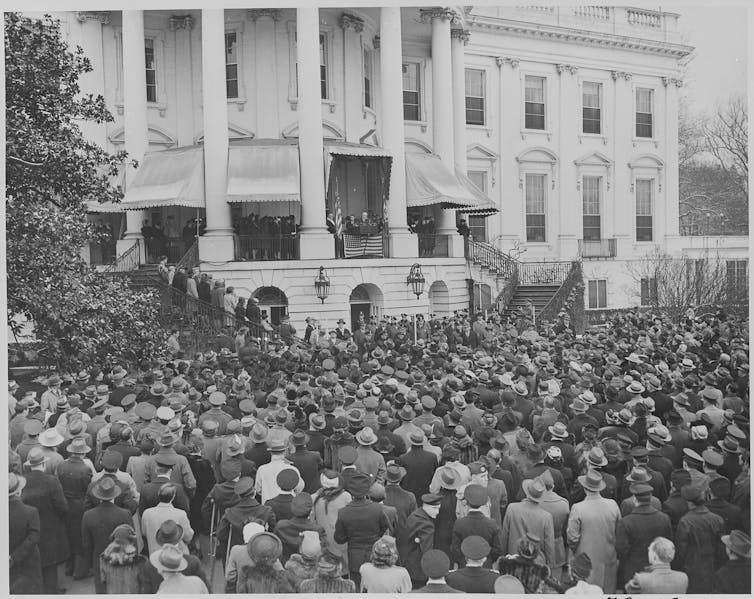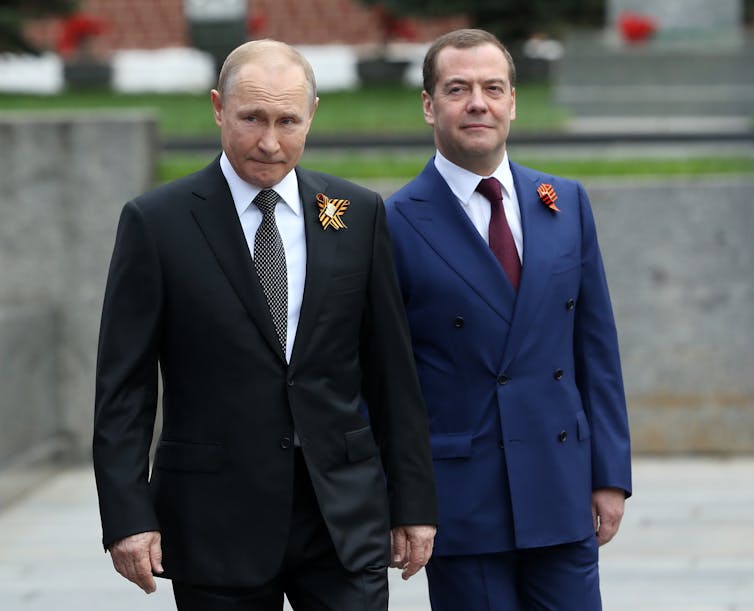Do you think Donald Trump will be unable to serve as president after his second term ends in January 2029? Think again.
President-elect Donald Trump floated the idea of re-election during a meeting with congressional Republicans shortly after his November 2024 election victory: "I doubt I would run again unless you said, 'He's great, we have to Consider something else.”
At first glance, this seems like an obvious joke. The 22nd Amendment to the Constitution clearly stipulates that Trump cannot be re-elected. The text of the amendment states:
"No person shall be elected President more than twice, and no person shall be elected President who has served as President or Acting President for more than two years during the term in which another person was elected President." "No person shall be elected President more than once." "
The amendment was passed in response to Franklin Roosevelt's four elections as president. Not since George Washington stepped down at the end of his second term has a president sought a third, let alone a fourth. The amendment was apparently intended to prevent a president from being elected for more than two terms.

Since Trump has already been elected president twice, the simple language of the amendment prohibits him from being elected a third time. Some argue that because Trump’s terms are not consecutive, the amendment does not apply to him. However, the amendment does not distinguish between consecutive terms and non-consecutive terms.
While the 22nd Amendment prohibits Trump from being re-elected as president, it does not prohibit him from serving as president after January 20, 2029. The reason is that the 22nd Amendment only prohibits someone from being "elected" more than twice. It makes no mention of someone becoming president in any other way than being elected president.
circumvent the rules
There are some potential alternatives. Under normal circumstances, they are nearly impossible. But Donald Trump has never been a normal president.
On issue after issue, Trump has pushed the outer limits of presidential power. Most importantly, he has shown a willingness to bend and even break the law in order to stay in office. Although Trump claims he was just joking when he floated the idea of a third term, he has long used "jokes" as a way to float the test balloon.
In addition, once he leaves office, Trump may once again face criminal prosecution and possibly even jail time, which will further incentivize him to stay in power. As Trump's second term progresses, don't be surprised if Americans hear more about how he might try to stay in office. Here's what the Constitution says about this prospect.
Other Ways to Become President
Nine have served as president but were not elected first. John Tyler, Millard Fillmore, Andrew Johnson, Chester Arthur, Theodore Roosevelt, Calvin Coolidge, Harry Truman, Lyndon Johnson, and Gerald Ford All vice presidents succeeded after the death or resignation of their predecessors.
The 22nd Amendment does not prohibit a term-limited president from being elected vice president. On the other hand, the Twelfth Amendment does provide that “any person not qualified under the Constitution to hold office as President shall be qualified to serve as Vice President of the United States.”
It is unclear whether this restriction applies to two-term presidents who are ineligible for re-election due to the 22nd Amendment, or whether it simply imposes on vice presidents the other standard of presidential qualifications set forth in the Constitution, namely that they are born natural Be a U.S. citizen, 35 years of age or older and have resided in the United States for at least 14 years.
The issue must be decided by the U.S. Supreme Court. If the justices rule in Trump's favor — as they recently did on the 14th Amendment's insurrection clause and presidential immunity issues — then the 2024 Trump-Vance ticket could become The 2028 Vance-Trump ticket. If elected, Vance would likely resign, allowing Trump to become president again.
No need to resign
But Vance doesn't even have to resign for Vice President Trump to exercise presidential powers. The 25th Amendment to the Constitution provides that if the President declares "that he is unable to discharge the powers and duties of his office...such powers and duties shall be discharged by the Vice President acting as President."
In fact, the United States already has three such acting presidents—George H.W. Bush, Dick Cheney, and Kamala Harris. Both had brief moments of presidential power when sitting presidents were under anesthesia during medical procedures; Cheney did it twice.
In this case, President Vance could invoke the 25th Amendment shortly after taking office on January 20, 2029, to notify the Speaker of the House and the President Pro Tempore of the Senate that he is unable to discharge the duties of the President. He does not need to give any reason or prove this incapacity.
Vice President Trump will then become Acting President and assume the powers of the President until President Vance issues a new notification indicating that he is able to resume the duties of the President.
"Series Democracy"
But the exercise of presidential power does not even necessarily require serving as president or acting president.
Trump has repeatedly expressed his admiration for autocratic Russian President Vladimir Putin, so he may want to follow the Medvedev-Putin example of “tandem democracy.”

In 2008, term limits in the Russian constitution prevented Putin from running for president after two consecutive terms. Instead, he chose a loyal subordinate, Dmitry Medvedev, to run for president.
After his election, Medvedev appointed Putin as prime minister. By most accounts, Putin remains firmly in power and makes most of the important decisions. Following this example, a future Republican president could appoint Trump to an executive branch position in which he would still wield power.
In 2012, Putin ran for president again, and he and Medvedev once again reversed roles. Putin has since succeeded in amending the Russian constitution, effectively allowing him to remain president for life.
Use a puppet
Then again, Trump might just want to follow the example of George and Lureen Wallace and avoid all this legal shenanigans. In 1966, the Alabama Constitution prohibited Wallace from running for governor for a third consecutive time. Still extremely popular and unwilling to relinquish power, Wallace chose to let his wife, Lureen, run for governor. It was obvious from the beginning that Lulene was just a puppet for George, who had promised to be his wife's adviser for a salary of $1 a year.
The campaign slogan, "Two Governors, One Cause," made it clear that a vote for Lulene was actually a vote for George.
Lulyn won by a landslide.
According to an account of Wallace's tenure, the Wallace family "had something of a queen-to-prime relationship: Mrs. Wallace handled the ceremonial and formal duties of the state. Mr. Wallace set the grand outlines of national policy." , and is responsible for overseeing its implementation.”
Trump's wife was not a U.S. citizen by birth and therefore ineligible to serve as president. But as the leader of the Republican Party, Trump can ensure that the next Republican presidential candidate is a member of his family or someone else who has absolute loyalty and obedience to him. If that person wins the White House in 2028, Trump could serve as an unofficial adviser, allowing him to continue to exercise presidential power without an actual title.